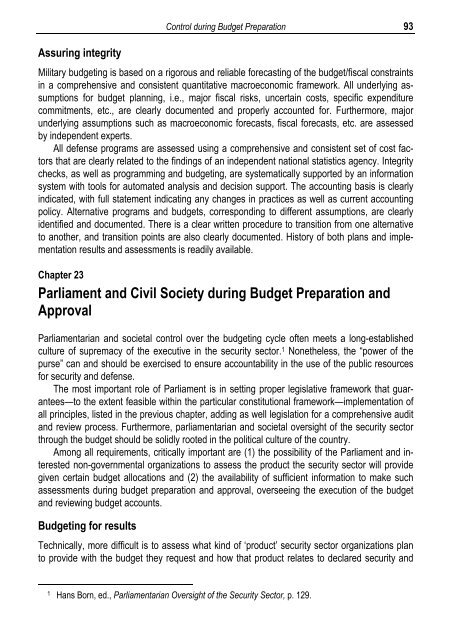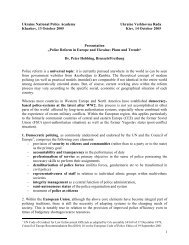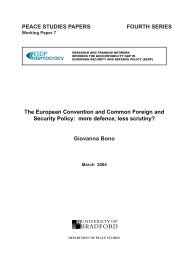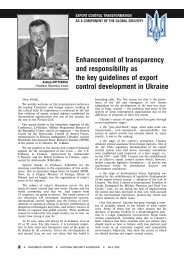Civil-Military Relations and Democratic Control of the Security Sector
Civil-Military Relations and Democratic Control of the Security Sector
Civil-Military Relations and Democratic Control of the Security Sector
You also want an ePaper? Increase the reach of your titles
YUMPU automatically turns print PDFs into web optimized ePapers that Google loves.
Assuring integrity<br />
<strong>Control</strong> during Budget Preparation<br />
<strong>Military</strong> budgeting is based on a rigorous <strong>and</strong> reliable forecasting <strong>of</strong> <strong>the</strong> budget/fiscal constraints<br />
in a comprehensive <strong>and</strong> consistent quantitative macroeconomic framework. All underlying assumptions<br />
for budget planning, i.e., major fiscal risks, uncertain costs, specific expenditure<br />
commitments, etc., are clearly documented <strong>and</strong> properly accounted for. Fur<strong>the</strong>rmore, major<br />
underlying assumptions such as macroeconomic forecasts, fiscal forecasts, etc. are assessed<br />
by independent experts.<br />
All defense programs are assessed using a comprehensive <strong>and</strong> consistent set <strong>of</strong> cost factors<br />
that are clearly related to <strong>the</strong> findings <strong>of</strong> an independent national statistics agency. Integrity<br />
checks, as well as programming <strong>and</strong> budgeting, are systematically supported by an information<br />
system with tools for automated analysis <strong>and</strong> decision support. The accounting basis is clearly<br />
indicated, with full statement indicating any changes in practices as well as current accounting<br />
policy. Alternative programs <strong>and</strong> budgets, corresponding to different assumptions, are clearly<br />
identified <strong>and</strong> documented. There is a clear written procedure to transition from one alternative<br />
to ano<strong>the</strong>r, <strong>and</strong> transition points are also clearly documented. History <strong>of</strong> both plans <strong>and</strong> implementation<br />
results <strong>and</strong> assessments is readily available.<br />
Chapter 23<br />
Parliament <strong>and</strong> <strong>Civil</strong> Society during Budget Preparation <strong>and</strong><br />
Approval<br />
Parliamentarian <strong>and</strong> societal control over <strong>the</strong> budgeting cycle <strong>of</strong>ten meets a long-established<br />
culture <strong>of</strong> supremacy <strong>of</strong> <strong>the</strong> executive in <strong>the</strong> security sector. 1 None<strong>the</strong>less, <strong>the</strong> “power <strong>of</strong> <strong>the</strong><br />
purse” can <strong>and</strong> should be exercised to ensure accountability in <strong>the</strong> use <strong>of</strong> <strong>the</strong> public resources<br />
for security <strong>and</strong> defense.<br />
The most important role <strong>of</strong> Parliament is in setting proper legislative framework that guarantees—to<br />
<strong>the</strong> extent feasible within <strong>the</strong> particular constitutional framework—implementation <strong>of</strong><br />
all principles, listed in <strong>the</strong> previous chapter, adding as well legislation for a comprehensive audit<br />
<strong>and</strong> review process. Fur<strong>the</strong>rmore, parliamentarian <strong>and</strong> societal oversight <strong>of</strong> <strong>the</strong> security sector<br />
through <strong>the</strong> budget should be solidly rooted in <strong>the</strong> political culture <strong>of</strong> <strong>the</strong> country.<br />
Among all requirements, critically important are (1) <strong>the</strong> possibility <strong>of</strong> <strong>the</strong> Parliament <strong>and</strong> interested<br />
non-governmental organizations to assess <strong>the</strong> product <strong>the</strong> security sector will provide<br />
given certain budget allocations <strong>and</strong> (2) <strong>the</strong> availability <strong>of</strong> sufficient information to make such<br />
assessments during budget preparation <strong>and</strong> approval, overseeing <strong>the</strong> execution <strong>of</strong> <strong>the</strong> budget<br />
<strong>and</strong> reviewing budget accounts.<br />
Budgeting for results<br />
Technically, more difficult is to assess what kind <strong>of</strong> ‘product’ security sector organizations plan<br />
to provide with <strong>the</strong> budget <strong>the</strong>y request <strong>and</strong> how that product relates to declared security <strong>and</strong><br />
1 Hans Born, ed., Parliamentarian Oversight <strong>of</strong> <strong>the</strong> <strong>Security</strong> <strong>Sector</strong>, p. 129.<br />
93

















